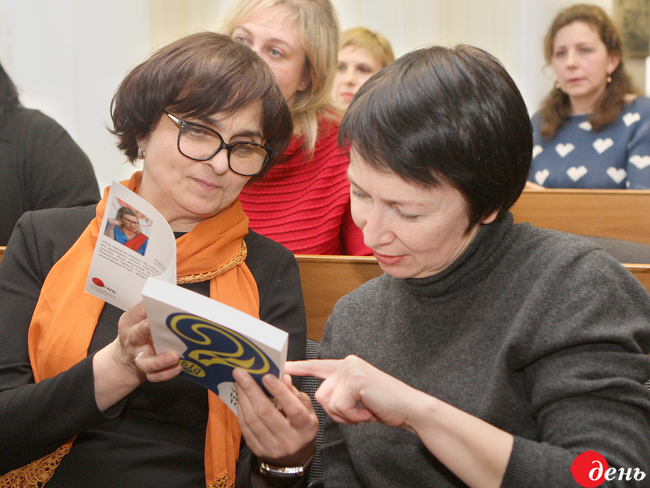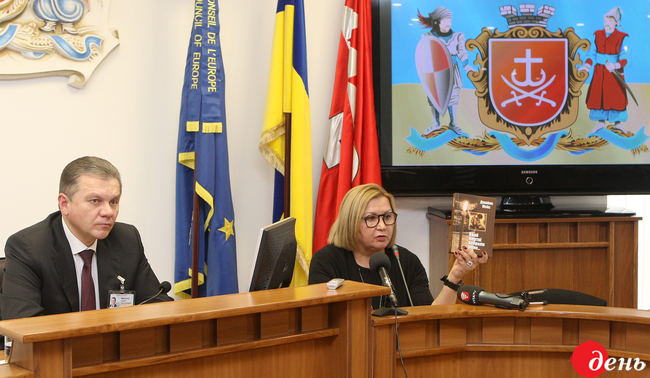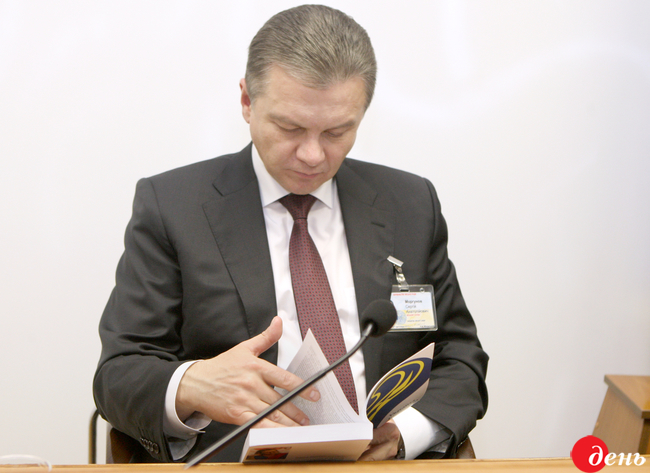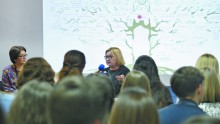It is not enough to call Den’s Day in Vinnytsia the event that everyone waited for, as the “National dialog” in Donetsk National University (DNU), the transfer of books from Den’s Library to the city schools, and the stream at local TV-channel VITA have been a huge success. After the meeting with Den/The Day’s editor-in-chief the citizens of Vinnytsia (those who were born here and those who became such having moved from Donetsk) have retained the desire to continue this meaningful conversation. Thus, this intellectual hunger will force them to seek new opportunities to organize Den’s Day in Vinnytsia. And Den’s Day will certainly return to the city!
“MODERN YOUTH FOCUSES ON THE FIGURES OF HISTORY”
Den did not come empty-handed to Vasyl Stus Donetsk National University. Before the visit, the newspaper gave a gift of five photos, exhibited at the 18th Den’s International Photo Exhibition. It is symbolical, that they were put on display near the memorial plaque in honor of Yurii Matushchak – Donetsk volunteer killed in battle against Russian invaders. He was one of the initiators of naming the university after Vasyl Stus, the idea which Den has been supporting for many years.
Another remarkable detail became clear during a conversation between Larysa Ivshyna and the university teachers. One of the photographs presented to the university is The Shell-Strewn Road by Yurii Velychko. At the opening of Den’s Photo Exhibition in Kyiv, the photographer was handed the award by Inna Yermakova, teacher at DNU Department of Journalism and representative of the National Union of Photographers.

“There has to be some magic involved, as the work by Yurii Velychko, that was chosen for the award by the Union and whom I personally know very well, came to our university. Symbolically, this photo is now put on display near the bas-relief of Yurii Matushchak, who graduated from Donetsk National University and died in the battles of Ilovaisk,” says Yermakova. “I wanted to ask Ms. Ivshyna, but she had answered my question before I even asked it, commenting that people do read newspapers, but that visual image is very important. I would like to thank her for having Den newspaper found such an exhibition. As a specialist, I’ve been observing it for many years. The exhibition is the most visited and publicized. But it is important that it has an educational moment, for the viewer must be accustomed to high-quality pictures. In general, the conversation left a good aftertaste. I am constantly involved with people, but an opportunity to join a profound and warm conversation, which makes one think, is nevertheless a rare one. And the conversation is seemingly over, but the thoughts and the internal dialog go on.”
During the “National Dialog,” Ivshyna said that the history of Donetsk National University is “full of drama against the backdrop of time.” She recalled how difficult it was 10-15 years ago to organize live communication with students at eastern universities.

“Before coming to Vasyl Stus Donetsk National University in Vinnytsia, I looked through the materials by our newspaper covering DNU and my travels in eastern Ukraine. ... The first time I literally had to break in Donetsk. It was around 2003. Then it was probably the only time I had to use my personal connections. I asked Yevhen Marchuk for help, and he spoke with the president and the prime minister so that I was given permission to hold a meeting at the university,” says Ivshyna. “Now you may wonder how this could be! But it’s true. I was given a polite yet detached meeting. And even then I had felt the tension. In the prefaces to the books ‘The Trap’ and I, an eyewitness of Den’s journalistic triptych I wrote that Donbas was given away on ‘lease.’ Even back then the humanitarian occupation was apparent. And the enthusiasts who never gave up and went on to personally oppose that system deserve the merit. Despite the ordeal, you were able to save your University, which chose Ukraine, you filled it with content and acquired interesting initiatives already in Vinnytsia.”

“I remember as the Department of Journalism hosted Larysa Ivshyna in March 2013 in Donetsk, and back then it was very difficult. The meeting was very warm, the students were reluctant to let go of Den’s editor-in-chief, they almost drowned her in the questions, but such an atmosphere had obviously developed not because of general mood, but in spite of it,” picks up the conversation Olena Taranenko, Head of the Department of Journalism at DNU.

“For there could not be any student meeting with Ivshyna (so we were told ‘from above’), so we had to invent a scientific conference of convergent media and invite Ivshyna as an expert. But the students did not care about the pretext under which to see and chat with the legend of Ukrainian journalism,” continues Taranenko. “I remember a lot of questions had been asked about the national idea and being Ukrainian as a concept, about the standards of journalism, about censorship and political pressure on the media on behalf of the authorities. The organizers were shocked, and the students and we, the staff, were delighted. The discussion of this ‘conference’ lasted a long time between those interested. But it was more a kind of ‘studies of a hermetic society,’ because the atmosphere was not very open for a loud debate.”

VINNYTSIA MAYOR SERHII MOZGUNOV IS NOT ONLY A SUCCESSFUL MANAGER, BUT ALSO A PERSON WHO UNDERSTANDS THE IMPORTANCE OF THE HUMANITARIAN COMPONENT IN THE DEVELOPMENT OF THE REGION, AS HE IS A HISTORIAN BY EDUCATION. HE PRAISED DEN’S PROJECTS AS AN EXTREME EFFORT, BECAUSE “WORKING NOT ONLY IN THE MEDIA PLANE, BUT ALSO PUBLISHING THAT BRINGS TOGETHER SCIENTISTS, HISTORIANS, BOTH GENERAL AND LOCAL, AND JOURNALISTS IN AN EFFORT TO SHED SOME LIGHT ON THE PAST IS A FEAT”
“Remembering those meetings in Donetsk, I was carefully inspecting the students at the meeting here, in Vinnytsia. Would the students be as interested and active, would they feel this ‘nerve,’ if such a meeting now is no sign of resistance, opposition, action, almost a feat – it is only a meeting with an interesting person? Fortunately, my fears were unsubstantial. Besides the fact that this meeting became a real conversation between old friends, colleagues, and associates, I want to focus on one detail, which was very revealing to me. There was some student’s question, and Ivshyna replied, smiling: ‘It is strange that my biography interests you more than our newspaper and projects.’ I cannot judge what is more interesting and what is less, but for me this is a good sign. The youth of today, just as the young people at, perhaps, all times, is focused on the figures of history, on people, which they want to be like. They read a lot about Larissa Ivshyna in preparation for the meeting, because they choose a newspaper or a book by a person who is identified with it. However, reading and communication face to face are certainly different. And as it turned out, they could not imagine most of what they saw: that this charming, smart, yet down-to-earth, smiling woman – is ‘the same Ivshyna’ who had worked for two years after school as a plasterer and bricklayer; that the secret of her success was a ‘history of failures, the ability to say no’; that she became a press secretary not out of the desire to become famous, but wanting to help the person, whom she immediately and wholeheartedly believed... and more – details, details, details. Personal, humane, sometimes funny and sometimes scary. But because of this, I think our students have discovered a woman who has become their model of a journalist. Today I spoke to many of them, and they are all alike sharing this impression. So, I think it will be the right thing and a decent result, if someone develops an interest to the newspaper or to the Den’s books through this (true, not learned) interest in the biography, through this almost childlike surprise and the desire to see what drives this person they are lucky enough to meet. And for me it was the main result of this meeting – Ivshyna impressed them all! Both those who have the honor to be friends with her a long time, and especially those who saw her for the first time. And for this we want to express our huge sincere gratitude to her!”







